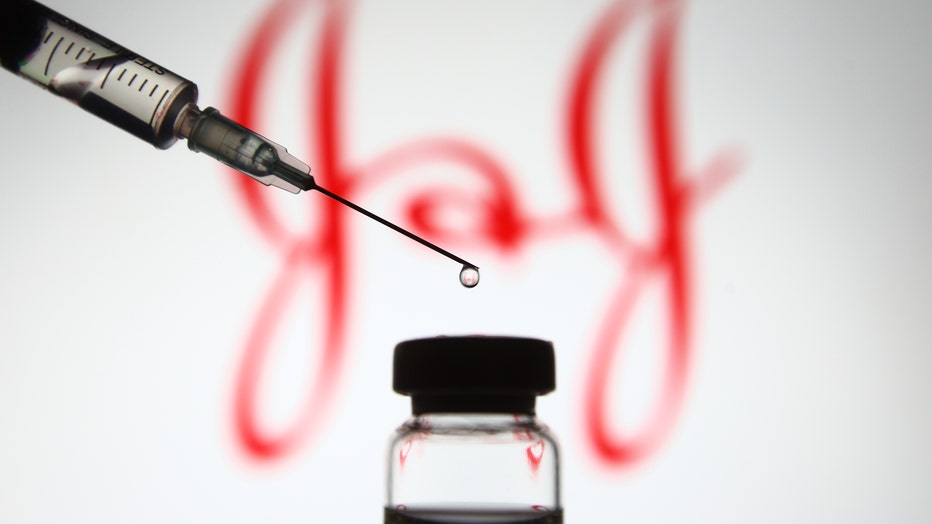Study: J&J COVID-19 vaccine significantly less effective against delta variant
A study published on July 19 on the medical journal website BioRxiv found that the single-dose Johnson & Johnson vaccine was significantly less effective against the highly transmissible delta and lambda variants compared with two-dose vaccines from Pfizer and Moderna.
Study authors found that while the two-dose vaccines were 94-95% effective in preventing COVID-19, the J&J vaccine had only 66.9% efficacy "in preventing moderate to severe disease."
The study compared the efficacy and drop-off rate of antibody protection from all three vaccines and found that neutralization of the delta and lambda variants decreased with the J&J vaccine.

FILE- UKRAINE - 2021/02/05: In this photo illustration a Johnson & Johnson logo is seen in front of a medical syringe and a vial with coronavirus vaccine. (Credit: Pavlo Gonchar/SOPA Images/LightRocket via Getty Images)
Study authors said if there continues to be a trend of breakthrough infections accompanied by severe illness caused by the novel coronavirus, the millions of people who have been inoculated with the J&J vaccine may want to consider a booster shot in order to increase protection against variants of concern.
The study authors also said that while there is not currently enough evidence to support the need for a booster, the medical community’s focus should be on primary vaccination efforts in the U.S. and globally.
The new study has not yet been peer-reviewed and is based on laboratory experiments.
"The message that we wanted to give was not that people shouldn’t get the J&J vaccine, but we hope that in the future, it will be boosted with either another dose of J&J or a boost with Pfizer or Moderna," Nathaniel Landau, lead study author, told the New York Times.
Earlier this month, Johnson & Johnson reported that its vaccine is effective against the highly contagious delta variant, even eight months after inoculation.
"We believe that our vaccine offers durable protection against COVID-19 and elicits neutralizing activity against the Delta variant. This adds to the robust body of clinical data supporting our single-shot vaccine’s ability to protect against multiple variants of concern," said Payul Stoffels, chief scientific officer at Johnson & Johnson in a July 1 press release.
RELATED: Study: Delta variant can reduce Pfizer, Astrazeneca COVID-19 vaccine effectiveness
The recent findings on the J&J vaccine are consistent with medical observations about the delta coronavirus variant’s resistance to other vaccines.
In a study published in The Lancet on June 14, researchers observed patients both vaccinated and unvaccinated who tested positive for COVID-19 between April 1 to June 6, 2021 in Scotland, where the delta variant has become dominant.
Pfizer’s vaccine "offered very good protection: 92% (95% CI 90–93) S gene-negative, 79% (75–82) S gene-positive. Protection associated with ChAdOx1 nCoV-19 (Oxford–AstraZeneca vaccine) was, however, substantial but reduced: 73% (95% CI 66–78) for S gene-negative cases versus 60% (53–66) for those S gene-positive," according to The Lancet.
Authors of the study noted further research needs to be done for more accurate percentage estimates on both vaccines’ effectiveness.
The delta variant of the coronavirus now accounts for an estimated 83% of COVID-19 cases in the United States as it continues to surge largely among unvaccinated populations, officials said. The percentage is a dramatic increase from the week of July 3, when the highly transmissible variant accounted for about 50% of genetically sequenced coronavirus cases.
RELATED: Delta variant accounts for 83% of US COVID-19 cases, CDC says
The delta variant is a mutated version of the novel coronavirus that spreads more easily than other strains. It was first detected earlier this year in India, but now has been identified in countries around the world.
To date, 48.6% of the total U.S. population is fully vaccinated, including nearly 60% of American adults, CDC data shows.
This story was reported from Los Angeles. Kelly Hayes contributed.


